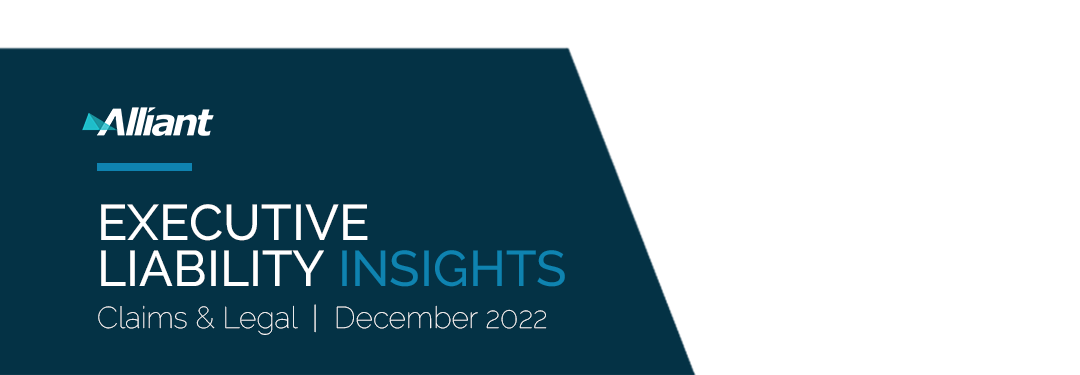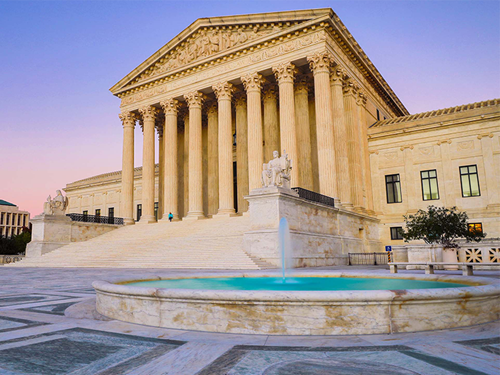
Navigating today’s complex risk environment can be a monumental task. Steve Shappell, Alliant Claims & Legal, spearheads Executive Liability Insights, a monthly review of news, legal developments and information on executive liability, cyber risk, employment practices liability, class action trends and more.

FEATURED ARTICLE
EXCESS INSURER'S NON-FOLLOW FORM EXCLUSIONARY LANGUAGE BARS COVERAGE DESPITE PAYMENT BY ALL UNDERLYING INSURERS
Travelers Casualty and Surety Co. of Am v. Jeld-Wen Holding, Inc., 3:21-cv-173-MOC-DCK (W.D.N.C. Nov. 18, 2022)
This coverage litigation arose when a fifth excess insurer on a directors and officers liability (“D&O”) tower of insurance refused to cover a securities claim after the underlying insurers had already paid out their limits.
In This Issue:
EXCESS INSURER'S NON-FOLLOW FORM EXCLUSIONARY LANGUAGE BARS COVERAGE DESPITE PAYMENT BY ALL UNDERLYING INSURERS
Travelers Casualty and Surety Co. of Am v. Jeld-Wen Holding, Inc., 3:21-cv-173-MOC-DCK (W.D.N.C. Nov. 18, 2022)
This coverage litigation arose when a fifth excess insurer on a directors and officers liability (“D&O”) tower of insurance refused to cover a securities claim after the underlying insurers had already paid out their limits. The excess insurer denied coverage for the securities claim and filed this action based upon an argument that prior customer antitrust claims were “related” claims first made prior to policy’s inception.
Read More >>
PLAIN MEANING OF INSURANCE: IF FACTS ALLEGED IN A COMPLAINT FALL WITHIN POLICY'S COVERAGE, INSURER HAS TO PAY
Liberty Ins. Underwriters Inc, v. Astellas US Holding, Inc., No. 2019 CH 14483 (Ill. Cir. Nov. 28, 2022)
The federal Anti-Kickback Statutes (“AKS”) prohibit pharmaceutical manufacturers from providing co-pay assistance to a specified class of Medicare beneficiaries. In some cases, even donations by pharmaceutical companies to patient assistance programs were deemed to risk violating AKS.
Read More >>
SURGICAL CENTER'S PROFESSIONAL LIABILITY COVERAGE RESCINDED DUE TO MISREPRESENTATIONS ON RENEWAL APPLICATION
Nat'l Fire & Marine Ins. Co.v. Cal. Minimally Invasive Surgical Ctr., Inc., No. CV 21-8462-GW-MRWx (C.D. Cal. Nov. 4, 2022)
In a recent case, a professional liability insurer resorted to the courts and successfully argued that rescission was appropriate where its insured, a surgical center, made material misrepresentations on its policy renewal application.
Read More >>
COURT RELIES ON POLLUTION EXCLUSION TO HOLD D&O INSURER HAS NO DUTY TO DEFEND OR INDEMNIFY
Gold Coast Commodities, Inc. v. Travelers Ins. Co., No. 3:22-cv-207 (S.D. Miss. Dec. 5, 2022)
A Mississippi District Court found a pollution exclusion in a directors and officers liability (“D&O”) policy supported the insurer’s denial of coverage. The underlying action arose from lawsuits filed by two cities for the alleged discharge of untreated, highly toxic wastewater into the city sewer systems. In both suits, the insured was found liable for committing numerous violations of state laws regulating pollution of waters.
Read More >>
FAILURE TO TIMELY REPORT SUIT AGAINST ENTITY BARRS COVERAGE FOR OFFICERS SUBSEQUENTLY ADDED TO LITIGATION
Hanover Ins. Co. v. R.W. Dunteman Co., No. 19-cv-1979 (7th Cir. Oct. 24, 2022)
Applying Illinois law, the Seventh Circuit Court of Appeals ruled that the addition of defendants to a lawsuit does not create a new claim and is instead a related claim to the original lawsuit naming only the corporate entity. In this case, litigation was filed in a dispute over ownership interests in a family business, with the original complaint only naming one of the insured entities as a defendant.
Read More >>
"INTERRELATED" LEGAL MALPRACTICE CLAIM BARRED FROM COVERAGE UNDER PROFESSIONAL LIABILITY POLICY
Henry v. Maxum Indem. Co., No. 2:20-cv-02995 (E.D. La. Nov. 8, 2022)
A Louisiana federal court recently dismissed an insurer’s coverage action in light of the insured’s failure to show that a claim was both made and reported during the policy period. The court also failed to find any ambiguity in the conditions section of the professional liability policies at issue, which set forth terms for “Related Claims and Related Wrongful Acts.”
Read More >>
SUPREME COURT OF SOUTH DAKOTA ALLOWS STATE STATUTE TO CONTROL OVER POLICY
Dieter v. XL Specialty Ins. Co., No. 980 N.W.2d 229 (S.D. 2022)
In reliance on a state statute, the Supreme Court of South Dakota permitted a liquidator’s notice of claim four months after the policy period ended. An insurer that become insolvent is subject to state regulation and may not seek protection under the Bankruptcy Code. As a result, the Legislature enacted statutory procedures to allow a liquidator to assist distressed insurers and, if necessary, liquidate an insolvent insurer’s assets and pay remaining claims.
Read More >>
CYBER CORNER
Click to read the following cases:
- ONE SMALL STEP, ONE GIANT LEAP: NAIC REPORT REFLECTS VITALITY OF CYBER INSURANCE MARKET
- HOLD THE PHONE: CYBER INSURER MUST COVER TELCO’S LOSS FROM DATA BREACH WITHOUT OFFSETTING RECOVERED FUNDS
- SOFTWARE COMPANY GRANTED CYBER COVERAGE FOLLOWING DATA BREACH
Read More >>
EPL CORNER
Click to read the following cases:
- LATE NOTICE COSTS UNIVERSITY COVERAGE IN AFFIRMATIVE-ACTION LITIGATION
- OUSTED CFO’s SUIT NOT COVERED UNDER EPL POLICY
- THE FINAL RULE AND ITS EFFECTS ON THE INVESTMENT DUTIES REGULATION
Read More >>
SEC CORNER
Click to view the following cases:
- SEC ADOPTS FINAL CLAWBACK RULES
- SEC ANNOUNCES 2022 ENFORCEMENT RESULTS
- NOVEMBER 2022 NOTEWORTHY SETTLEMENTS AND JUDGMENTS
Read More >>
SHAREHOLDER CORNER
Click to view:
- NOVEMBER 2022 SECURITIES CLASS ACTION FILINGS
Read More >>
EXCESS INSURER'S NON-FOLLOW FORM EXCLUSIONARY LANGUAGE BARS COVERAGE DESPITE PAYMENT BY ALL UNDERLYING INSURERS
Travelers Casualty and Surety Co. of Am v. Jeld-Wen Holding, Inc., 3:21-cv-173-MOC-DCK (W.D.N.C. Nov. 18, 2022)
This coverage litigation arose when a fifth excess insurer on a directors and officers liability (“D&O”) tower of insurance refused to cover a securities claim after the underlying insurers had already paid out their limits. The excess insurer denied coverage for the securities claim and filed this action based upon an argument that prior customer antitrust claims were “related” claims first made prior to policy’s inception.

The coverage question at issue was whether the two claims fit within the policy’s definition as claims for “interrelated wrongful acts” or, in other words, claims with “related facts, circumstances, or situations” as provided by the policy. The excess insurer’s policy generally followed the form of the primary policy, “except as otherwise provided.” Relevant here, the excess policy provided two additional coverage exclusions: the preceding claim and prior notice exclusions. First, citing the preceding claim exclusion, the excess insurer argued that the securities claim and preceding consumer antitrust claims were interrelated wrongful acts that should have been treated as a single claim, and as such, were excluded from coverage since the antitrust lawsuit predate policy period. Second, the excess insurer similarly argued that the prior notice exclusion barred coverage for the securities lawsuit.
The policy broadly defined “interrelated wrongful acts” as acts “that have as a common nexus any fact, circumstance, situation, event, transaction, cause or series of causally connected facts, circumstances, situations, events, transactions or causes.” The excess insurer asserted that the facts created a common nexus sufficient to make the antitrust and securities claims a single claim. The excess policy precluded coverage “for any Claim made, or deemed first made, before the Policy Period.”
Unfortunately, the court sided with the excess insurer and excluded coverage for a securities claim based on a prior non-securities (non-D&O) litigation. The court found the two claims shared a common cast of characters; the same officers who engaged in antitrust violations also misrepresented corporate success to its shareholders. Although the conduct in each claim was different, the court nevertheless concluded the insured hid the same illicit conduct from both its customers and its shareholders, which served as a factual predicate for both claims.
The court, therefore, concluded that two claims alleging the same scheme or involving the same actors who are hiding the same conduct, constitute claims that comfortably fall within the commonly accepted definition of a factual nexus, rather than on the outskirts of a broad understanding of the concept. Likewise, the court held the term “related facts, circumstances, or situations” was unambiguous, where the word “related” had a common and clear meaning that “cover[ed] a very broad range of connections, both causal and logical.” Finally, the court also deprived of any significance the fact that ALL the insurers in the tower had already paid except for the fifth excess insurer, concluding that “the decision by other insurers not to challenge the … tower’s coverage of the Securities Settlement does not give credibility to a different determination.”
The Takeaway
This case raises many troubling issues. From excess policy language not being true “follow form” to one of six insurers taking inconsistent positions and arguing that uncovered non-D&O/securities consumer anti-trust claims were “related” claims and not covered under the D&O insurance policies in existence at the time the first D&O/securities claim was actually made.
PLAIN MEANING OF INSURANCE: IF FACTS ALLEGED IN A COMPLAINT FALL WITHIN POLICY’S COVERAGE, INSURER HAS TO PAY
Liberty Ins. Underwriters Inc, v. Astellas US Holding, Inc., No. 2019 CH 14483 (Ill. Cir. Nov. 28, 2022)
The federal Anti-Kickback Statutes (“AKS”) prohibit pharmaceutical manufacturers from providing co-pay assistance to a specified class of Medicare beneficiaries. In some cases, even donations by pharmaceutical companies to patient assistance programs were deemed to risk violating AKS.

In its desire to provide access to a drug that differs from other available treatment-methods to patients suffering from metastatic castration-resistant prostate cancer, a pharmaceutical company preoccupied its in-house legal department and outside counsel to perform an AKS analysis for its funding program. After obtaining both approvals, the company created a fund providing co-pay assistance to patients prescribed the drug. As a result, the federal government served the company with a subpoena that demanded documents to further the U.S. Department of Justice’s investigation of alleged Federal Healthcare offenses.
The company put its primary and excess insurers on notice about receiving the subpoena, the request to enter into a tolling agreement, settlement negotiations, and the settlement agreement. Later, the company claimed a deduction for the settlement payment it made. The insurer, with the policy wording stating that a “Claim” was defined as a “written demand for monetary, non-monetary[,] or injunctive relief made against an Insured” and a “written request to toll … the applicable statute of limitations relating to a potential Claim against an Insured for a Wrongful Act,” brought a court action. The insurer argued that the subpoena, the tolling request, and the civil settlement were not claims as defined in the policy. Moreover, the insurer asked the court to find that the deductibility on the taxes successfully claimed by the company reduced the amount of loss. Finally, the insurer claimed that a settlement reached pursuant to a statutory violation was uninsurable as a matter of public policy.
The court ruled in favor of the pharmaceutical company, stating that everything—the subpoena, the tolling request, and the civil settlement—fell within the definition of a “Claim” under the policy. Additionally, according to the court, neither the tax break nor public policy prevented the company from obtaining insurance coverage under a policy written to cover such loss.
The Takeaway
One may argue that the shift of consequence-bearing functions from the pharmaceutical company onto the insurer frustrates the purpose of AKS by releasing the latter from direct accountability for contributing to the rise of drug prices. Nevertheless, this case’s lesson is that insurers should not misplace their reliance on public policy when underwriting the wording of their own policies.
SURGICAL CENTER’S PROFESSIONAL LIABILITY COVERAGE RESCINDED DUE TO MISREPRESENTATIONS ON RENEWAL APPLICATION
Nat'l Fire & Marine Ins. Co.v. Cal. Minimally Invasive Surgical Ctr., Inc., No. CV 21-8462-GW-MRWx (C.D. Cal. Nov. 4, 2022)
In a recent case, a professional liability insurer resorted to the courts and successfully argued that rescission was appropriate where its insured, a surgical center, made material misrepresentations on its policy renewal application.

The insurer argued the surgical center’s failure to report that the Medical Board imposed restrictions on the license of the center’s doctor constituted a misrepresentation for the purpose of the policy renewal. In response, the surgical center claimed its doctor was only “publicly reprimanded and ordered to enroll in and complete a recordkeeping course,” but did not have any restrictions on practicing medicine. Still, the court pointed to the unambiguous language of the application form that required the surgical center to disclose information about former disciplinary proceedings and consequences of the same, which asked whether “the license of any physician … providing services at the center been restricted, revoked[,] or suspended in the last five years?”
The court stated that “if being ordered to take a course within an allocated amount of time or risk further disciplinary action from the Medical Board is not a restriction on one’s medical license, this Court is not clear on what would Constitute a restriction,” implying that only that one failure to disclose would have justified rescission of the policy. Yet, the court proceeded to explain that it had other grounds to find misrepresentation, because even if the aforementioned order was not a restriction, the application proceeded to ask if “any of the current or former employees or contractors [had] … [e]ver been the subject of disciplinary or investigation proceedings, or reprimand by a governmental license board.” Because such information would have affected the renewal determination, the court ruled that this was a material misrepresentation.
Moreover, the court held that the surgical center failed to disclose several other lawsuits by conflating separate prompts of the application to argue that it was only required to disclose claims arising during the last ten full years. As such, the court rendered the policy void and deprived the medical center of any coverage.
The Takeaway
This decision’s implication is simple—when in doubt, disclose it on an insurance application because the contrary approach risks voiding any risk coverage when the event for which the insurance was purchased occurs. At the very least, insureds should work closely with their brokers and legal departments to determine what needs to be disclosed on insurance and renewal applications.
COURT RELIES ON POLLUTION EXCLUSION TO HOLD D&O INSURER HAS NO DUTY TO DEFEND OR INDEMNIFY
Gold Coast Commodities, Inc. v. Travelers Ins. Co., No. 3:22-cv-207 (S.D. Miss. Dec. 5, 2022)

A Mississippi District Court found a pollution exclusion in a directors and officers liability (“D&O”) policy supported the insurer’s denial of coverage. The underlying action arose from lawsuits filed by two cities for the alleged discharge of untreated, highly toxic wastewater into the city sewer systems. In both suits, the insured was found liable for committing numerous violations of state laws regulating pollution of waters. The insured submitted the matters for coverage, but the D&O insurer issued a full denial and coverage litigation ensued.
The issue before the court was whether the underlying lawsuits stated a claim that was within the coverage of the policy, and thus would trigger the duty to defend. An insurer’s duty to defend is triggered when a complaint has been filed with reasonable, plausible allegations of conduct covered by the policy. The insurer argued the D&O policy’s pollution exclusion precluded coverage, but the Insured contended the exclusion was ambiguous and thus at a minimum, the insurer had a duty to defend. The insured pointed out that a court recently found a similar exclusion was ambiguous due to the policy’s definition of “pollutant.” The court distinguished the present case, and seemingly the identical definition of “pollutant” and decided there was no reasonable interpretation under which the pollution exclusion would not apply to the subject allegations. Thus, the court held the pollution exclusion could not be clearer and ruled in favor of the carrier.
The Takeaway
The determination as to whether a policy provision is ambiguous is a question for the court to decide. The issue is not merely whether the provision is susceptible to more than one reasonable interpretation, but whether it is susceptible to a reasonable interpretation under which there is coverage for the claimed loss.
FAILURE TO TIMELY REPORT SUIT AGAINST ENTITY BARRS COVERAGE FOR OFFICERS SUBSEQUENTLY ADDED TO LITIGATION
Hanover Ins. Co. v. R.W. Dunteman Co., No. 19-cv-1979 (7th Cir. Oct. 24, 2022)

Applying Illinois law, the Seventh Circuit Court of Appeals ruled that the addition of defendants to a lawsuit does not create a new claim and is instead a related claim to the original lawsuit naming only the corporate entity. In this case, litigation was filed in a dispute over ownership interests in a family business, with the original complaint only naming one of the insured entities as a defendant. At the time of the original filing, there was a directors and officers liability (“D&O”) policy in place that covered both the defendant entity and the individual officers of the entities. The insureds did not place their D&O insurer on notice of the original lawsuit.
Over a year later (and several months after the renewal of the D&O policy), the lawsuit was amended to include several individual officers and an additional insured entity as defendants, at which point the insureds promptly placed their D&O insurer on notice. The insurer denied coverage, finding the amended complaint was not a new claim, but instead related back to the original complaint, of which the insurer never received notice during the applicable policy period. As such, coverage was denied for the entities and the officers based on untimely notice. Litigation ensued and the lower court sided with the D&O insurer.
On appeal, the insured argued that the addition of allegations and requested relief to the amended complaint made it a “new claim” first made during the policy period under which it was first noticed. The policy contained broad definitions for “related wrongful acts” and “related claims.” As the initial complaint contained allegations of wrongful acts against an insured entity, the original complaint was a reportable claim and the amended complaint related back to that original filing. Based on that, the court held that the claim was originally made prior to the policy period (as to all insured defendants) and the denial of coverage was proper.
Interestingly, the court made it a point to discuss why claims made policies have such strict notice requirements, pointing out that such policies enable insurers to more easily identify risk, allowing for “less-expensive policies,” but in turn require the insured to comply with “strict reporting requirements in order to get the benefit of less expensive coverage.”
“INTERRELATED” LEGAL MALPRACTICE CLAIM BARRED FROM COVERAGE UNDER PROFESSIONAL LIABILITY POLICY
Henry v. Maxum Indem. Co., No. 2:20-cv-02995 (E.D. La. Nov. 8, 2022)
A Louisiana federal court recently dismissed an insurer’s coverage action in light of the insured’s failure to show that a claim was both made and reported during the policy period. The court also failed to find any ambiguity in the conditions section of the professional liability policies at issue, which set forth terms for “Related Claims and Related Wrongful Acts.”

The underlying action involved two legal malpractice claims that alleged that a group of law firms failed to adequately file subsistence claims for several oil spill claimants. The insurer, who issued subsequent claims made and reported policies, argued it did not have any obligation to provide coverage because a virtually identical lawsuit alleging essentially the same wrongful acts against the law firms, was both made and noticed to the prior insurer on risk. The law firms argued that the language in the professional liability policy was overreaching and ambiguous, and that the latter filed suit was not “interrelated” to the earlier filed matter as it involved different parties and additional distinguishing facts.
The policy defined “Related Claims” as “all Claims based on, arising out of, directly or indirectly resulting from, in consequence of, or in any way involving the same Wrongful Act or related Wrongful Acts shall be considered a single Claim to have been made at the time the earliest such Claim was made.” Additionally, the policy defined “Related Wrongful Acts” as “all Wrongful Acts based on, arising out of, directly or indirectly resulting from, in consequence of, or in any way involving the same or related facts, circumstances, situations, transactions or events shall be considered related Wrongful Acts and will be treated under the Policy as one Wrongful Act and deemed to have occurred on the date of the first of the Wrongful Acts.”
After noting that the insureds had not offered any explanation as to why the insurer’s relatedness language was ambiguous, the court agreed with the insurer in finding that no “Claim” was made or reported during the policy period at issue. Furthermore, the court focused on the “in any way” language in the related claims definition and determined that “the alleged wrongful acts of the … Defendants in each case are based upon the same or related facts, circumstances, and events, such that the claims involve related “Wrongful Acts” and should be considered a single claim made that was made against the … Defendants when the earlier claim was made.”
The Takeaway
The devil continues to be in the details. Courts are not only looking to the language of policies on relatedness, but also to the specific circumstances that can align cases together as one “Claim.” In the instant matter, it did not help that the insureds cited to the earlier filed claim in its second amended complaint!
SUPREME COURT OF SOUTH DAKOTA ALLOWS STATE STATUTE TO CONTROL OVER POLICY
Dieter v. XL Specialty Ins. Co., No. 980 N.W.2d 229 (S.D. 2022)
In reliance on a state statute, the Supreme Court of South Dakota permitted a liquidator’s notice of claim four months after the policy period ended. An insurer that become insolvent is subject to state regulation and may not seek protection under the Bankruptcy Code.

As a result, the Legislature enacted statutory procedures to allow a liquidator to assist distressed insurers and, if necessary, liquidate an insolvent insurer’s assets and pay remaining claims.
During the policy period, a liquidator filed a petition for an order of liquidation in a South Dakota circuit court, which was granted shortly thereafter. The policy in question was a claims made policy with a policy period of one year plus a two month extended reporting period. Despite the language in the policy, four months after the policy period ended, the liquidator sent a notice of claim letter to the insurers seeking coverage. The following month, the liquidator commenced an action against the directors and officers, alleging various actions that led to the unsuccessful rehabilitation of an insolvent insurer. The second excess insurer refused to pay, asserting the liquidator’s letter was untimely because it was filed outside the policy period.
The liquidator argued the notice letter fell within a state statute, which provided a Liquidator 180 days to pursue claims where the insurer and insured have agreed to a “period of limitation for filing any claim and the limitation period had not expired at the date of filing the petition.” The court determined the “fixed period of limitation” was the policy period itself, and thus triggered the statute. The court went on to state that “where it is necessary to review a provision in light of statutory law, the court relates the statute as if it were actually written into the policy.” Thus, the notice letter was timely as both the petition and order came within the policy period.
Cyber Corner
ONE SMALL STEP, ONE GIANT LEAP: NAIC REPORT REFLECTS VITALITY OF CYBER INSURANCE MARKET
The National Association of Insurance Commissioners (“NAIC”) recently issued its annual report on the state of the cyber insurance market. The report could best be described as, “one small step, one giant leap.”
HOLD THE PHONE: CYBER INSURER MUST COVER TELCO’S LOSS FROM DATA BREACH WITHOUT OFFSETTING RECOVERED FUNDS
T-Mobile USA, Inc. v. Steadfast Ins. Co., et al., No. 82704-9-1 (Ct. App. Wash. Nov. 28, 2022)
A three-judge appellate panel in Washington state held that a mobile phone company’s 2015 data breach is covered under its cyber policy without any reduction by the insurer for funds the insured was able to recover from its vendor.
SOFTWARE COMPANY GRANTED CYBER COVERAGE FOLLOWING DATA BREACH
Fishbowl Sols. Inc. v. The Hanover Ins. Co., No. 21-792 (D. Minn. Nov. 4, 2022)
A Federal court ruled in favor of a software company following a data breach in which a bad actor gained access to its computer system. The underlying facts of the data breach were not at issue; rather, the debate centered on whether there was coverage under the cyber policy’s Cyber Business Interruption and Extra Expense Clause.
LATE NOTICE COSTS UNIVERSITY COVERAGE IN AFFIRMATIVE-ACTION LITIGATION
President and Fellows of Harvard Coll. v. Zurich Am. Ins. Co., No. 1:21-cv-11530 (D. Mass. Nov. 2, 2022)
A Massachusetts District Court recently ruled in favor of an excess insurer on the issue of whether an insured university provided timely notice of litigation, finding an excess insurer was not obligated to provide its limits towards the university’s defense.
OUSTED CFO’s SUIT NOT COVERED UNDER EPL POLICY
Madison Mech., Inc. et. al. v. Twin City Fire Ins. Co. et. al., No. 19-2406 (4th Cir. Nov. 29, 2022)
The Fourth Circuit Court of Appeals recently upheld the finding that a lawsuit commenced by the former CFO of a contracting company was not an “Employment Practices Wrongful Act” as defined by the company’s employment practice liability (“EPL”) policy.
THE FINAL RULE AND ITS EFFECTS ON THE INVESTMENT DUTIES REGULATION
The Investment Duties regulation has been considered and amended consistently over the last thirty years. Under the Trump Administration, the Investment Duties regulation attempted to prohibit the consideration of climate change and other environmental, social, and governance (“ESG”) factors when ERISA fiduciaries are making investment decisions.
SEC Corner
SEC ADOPTS FINAL CLAWBACK RULES
The U.S. Securities and Exchange Commission (“SEC”) recently adopted final rules implementing Section 954 of the Dodd-Frank Wall Street Reform and Consumer Protection Act, which added Section 10D of the Securities Exchange Act of 1934 that will require listed companies to disclose and implement policies to “claw back” incentive compensation paid as a result of erroneously reported financial information that is subject to a required accounting restatement.
SEC ANNOUNCES 2022 ENFORCEMENT RESULTS
The U.S. Securities and Exchange Commission (“SEC”) has released its enforcement results for fiscal year 2022. The SEC filed 760 total enforcement actions, a 9% increase over the prior year.
NOVEMBER 2022 NOTEWORTHY SETTLEMENTS AND JUDGMENTS
| Amount | Director/Officer | Role | Company |
| $ 100,000.00 | Robert V.A Harra, Jr. | COO | Wilmington Trust |
| $ 50,000.00 | Ruben James Rojas | Chief Business Officer | Montebello Unified School District |
Source: U.S. Securities and Exchange Commission
Source: Stanford Law School Securities Class Action Clearinghouse
ABOUT ALLIANT INSURANCE SERVICES
Alliant Insurance Services is the nation’s leading specialty broker. In the face of increasing complexity, our approach is simple: hire the best people and invest extensively in the industries and clients we serve. We operate through national platforms to all specialties. We draw upon our resources from across the country, regardless of where the resource is located.
Contributors

Abbe Darr, Esq.
Claims Attorney
abbe.darr@alliant.com
David Finz, Esq.
Claims Attorney
david.finz@alliant.com
Isabel Arustamyan
Claims Advocate
isabel.arustamyan@alliant.com
Jacqueline Vinar, Esq.
Claims Attorney
jacqueline.vinar@alliant.com
Jaimi Berliner, Esq.
Claims Attorney
jaimi.berliner@alliant.com
Katherine Puthota
Senior Claims Advocate
katherine.puthota@alliant.com
Malia Shappell, Esq.
Claims Attorney
malia.shappell@alliant.com
Matia Marks, Esq.
Claims Attorney
matia.marks@alliant.com
Meaghan Fisher
Senior Claims Advocate
meaghan.fisher@alliant.com
Michael Radak
Claims Attorney
michael.radak@alliant.com
Robert Aratingi
Senior Claims Advocate
robert.aratingi@alliant.com
Robert Hershkowitz, Esq.
Claims Attorney
robert.hershkowitz@alliant.com
Steve Levine, Esq.
Claims Attorney
slevine@alliant.com